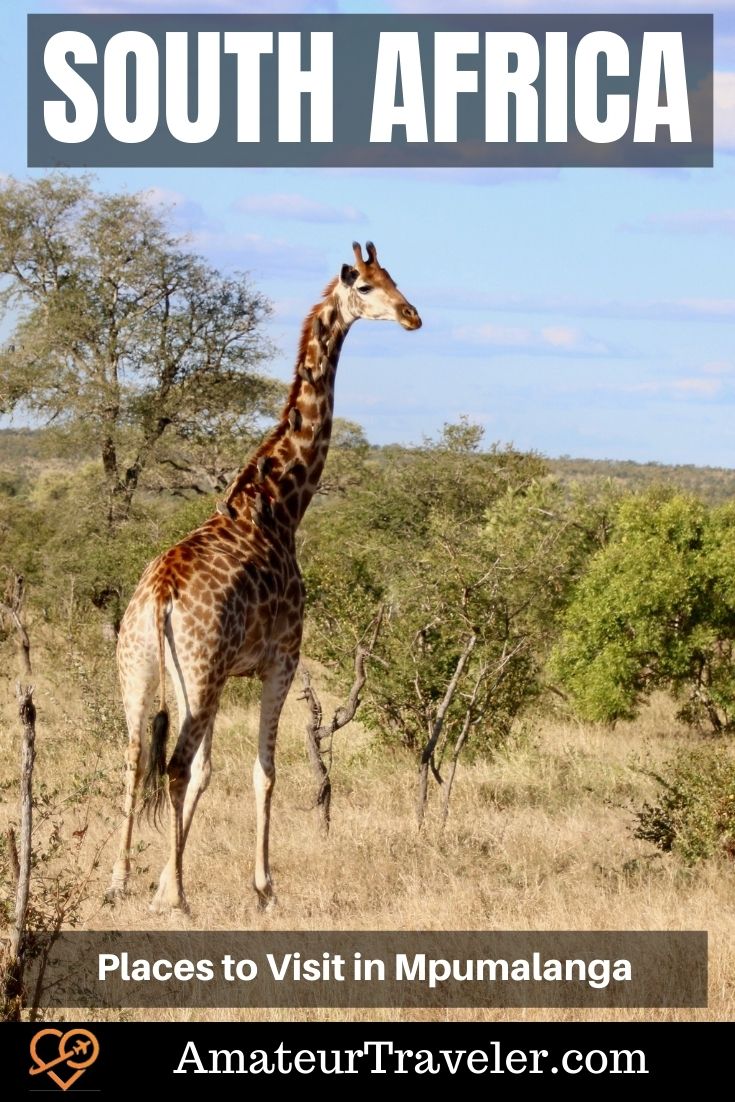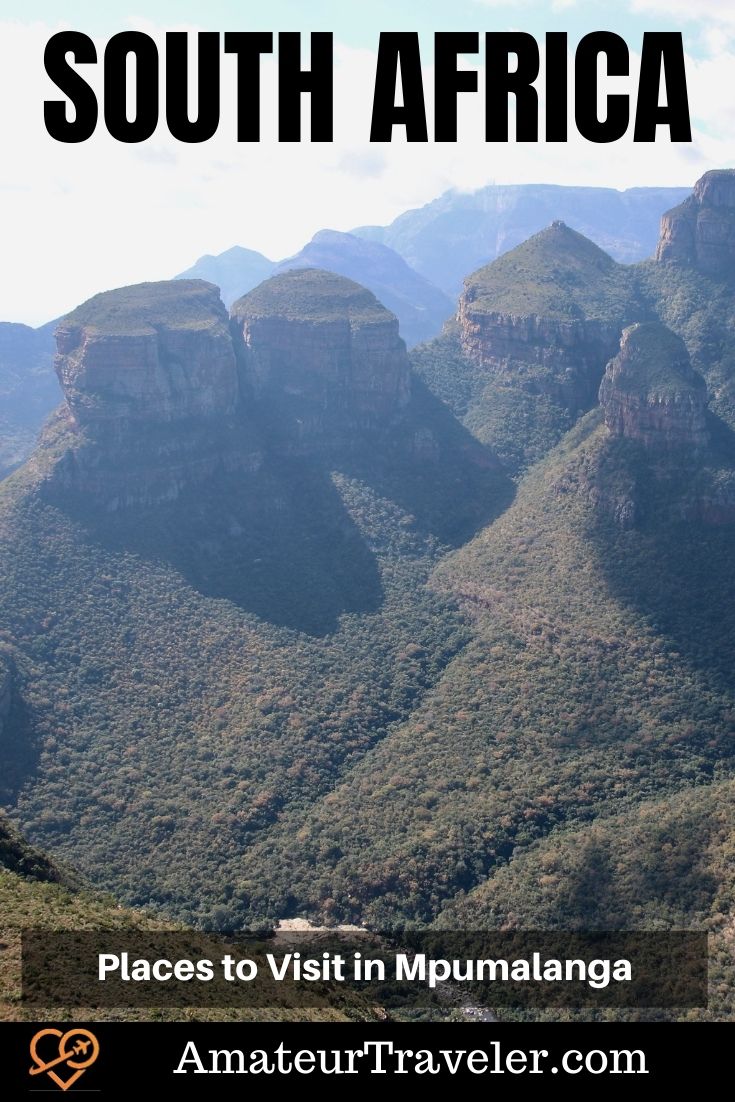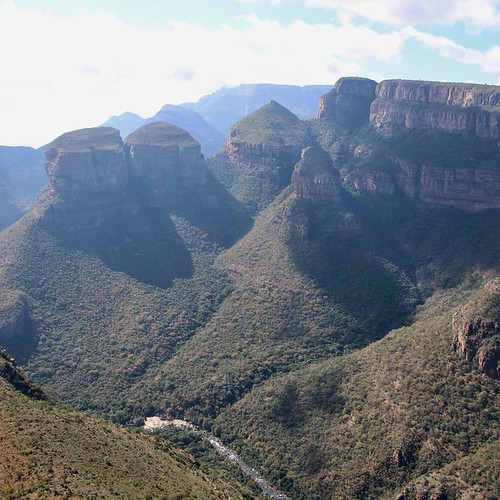Places to Visit in Mpumalanga – South Africa
Mpumalanga: Home of the Rising Sun in South Africa
Mpumalanga is one of South Africa’s top tourist destinations – and for good reason. Arguably, few regions in the world can compare with the extraordinary beauty of the Lowveld and escarpment as it rolls towards the sparkling Indian Ocean in the east. Mpumalanga covers nearly 80 000 km² (31 000 square miles) from rolling highlands to the lush wetlands.
Mpumalanga – a word that means “the place where the sun rises” in Zulu – is a province in eastern South Africa and on the borders between South Africa, Swaziland, and Mozambique. The province’s iconic Blyde River Canyon, which is the second-largest canyon in Africa, is home to phenomenal subtropical foliage. The province embraces the southern half of the Kruger National Park, a world-renowned nature reserve with abundant wildlife including the famous Big Five.

Table of contents: ()
Mpumalanga Road Trip
When touring Mpumalanga, take the popular Panorama route from the Lisbon-, MacMac-, or Berlin Falls to God’s Window. This route will bring you within easy reach of the Pinnacles, Bourke’s Luck Potholes, Pilgrims Rest, and, of course, the amazing Blyde River Canyon with the Three Rondavels. You simply can’t visit Mpumalanga without driving this scenic route. It is possible to drive it yourself, but you might be able to incorporate it into your itinerary if you’re looking for an experienced tour guide.
We did a round trip from Hazyview to Graskop and on to Sabie, with a detour stopping at God’s Window, Bourkes Luck Potholes, and Three Rondavels. Beautiful mountain passes are scattered with scenic viewpoints, waterfalls, and lookout points. On this occasion, we encountered misty weather at God’s Window, but on a clear day, you can see all the way to Mozambique.
After all the rains, the rivers were in full flow, and the waterfalls magnificent. Normally, most venues offer free entry. But during busy times – especially around long weekends – you’ll have to pay for parking and perhaps minimal fees are levied to access most of the waterfalls. The hiking routes to the waterfalls are clearly marked and clean as well, which makes for an enjoyable getaway.
If you’re doing a self-drive through Mpumalanga, be careful of potholes in places, especially surrounding the Lydenburg area. Information booklets on venues and activities in the area were available from every shop on our tour of Mpumalanga.
In Mpumalanga, you have access to everything that makes a visit to South Africa so unique. safaris, You can enjoy anything from swimming in waterfalls to day trips or multi-day tours of Kruger National Park, four-wheel-drive tours, cultural tours, archeology tours, or simply a picnic in nature or wildlife area. Let’s look at a breakdown of some of the most iconic places we saw on our visit to the province.

Baby Elephant – Kruger National Park

Kudu in Kruger National Park
Kruger National Park
We only spent one day in the park, which is not enough. We only saw two of the Big 5, probably because it was a rainy day. However, we saw many other animals including elephants and lions, although we only covered a small area of the vast park.

Kruger National Park Night Drive
Stay overnight in the park so that you can do an early morning or a night game drive. Be aware that private vehicles can not drive through the park at night and you can be fined if you don’t get to your campground before they close the gates.
Blyde River Canyon Nature Reserve
If the day is sunny, the experience will be absolutely unforgettable. A must-visit in South Africa. The Blyde River Canyon in the Mpumalanga province is one of the deepest canyons in the world, measuring up to 1400 meters in height and 25 km in length. This is one of South Africa’s most impressive natural features and a major attraction for those who enjoy the outdoors, hiking, and scenery.

We visited Blyde River Canyon on the return from our safari in Kruger National Park. It was so much more than we were expecting and the views from above were stunning. We got some fantastic photos with the river and canyon in the background. Unfortunately, we didn’t have time to do any hiking and just visited the viewpoint, but I would certainly like to come back here and spend a day or two hiking around the area.
While visiting the three rondavels, there is also an amazing view of the Blyde River and the canyon it created. It is perfectly possible to gaze at the magnificent view for hours.
We were not disappointed! The views were fantastic and we hiked the Guinea Fowl trail which went down to a swimming hole in the canyon before coming back up the other side. We had to pay an entrance fee to get into the Blyde River Canyon resort area, but there were two scenic viewpoints you could drive to in addition to the hiking trails. We enjoyed some drinks while watching the sunset at the upper viewpoint. It was a lovely afternoon and well worth the entry fee we paid. I highly recommend a visit.
The canyon forms the northern part of the Drakensberg escarpment and is mostly formed of red sandstone. Visitors will find outstanding viewpoints into the canyon along the R532.

Three Rondavels
A particularly popular stop in Mpumalanga (previously known as the Eastern Transvaal) is the Three Rondavels where you can peer deep into the canyon, viewing Blyderivierspoort Dam as well as the unique land formations on the opposite side, known as the Three Rondavels.
The three mountains get their name because they resemble the rondavels (cylindrical thatch houses) of the local people. They are named after the three wives of a legendary Bapedi chief, Maripi Mashile.
Also one can see the one “island” which is just a rock that sits in the middle of the river which is The Blyde River.
The entrance fee is not bad at all. There are vendors that sell typical flea market goods. If coming here bring along a water bottle your camera and maybe a pair of binoculars for closer zooming in. Otherwise, it’s one of nature’s wonders.
Note: For those wanting to spend a day or two in the Blyde River Canyon area, Graskop makes for a nice place to base yourself. The views are amazing. The lookout spot is quite small and the place can get very busy. You feel cramped and just want to get out of there. It is good for about 10 minutes of viewing and pictures. There is an entry fee at the gate. This place is absolutely stunning. There are mountains and rivers flowing in between the mountains. An excellent stop for photography.

Nearby Bourke’s Luck Potholes is a series of holes in the stone riverbed carved by the swirling waters. Take the time to get out of your car and hike the short hike over to a series of pools and waterfalls. They are named after John Bourke who staked a claim in the area in an effort to find gold. But apparently, Bourke’s luck was not good luck as no gold was discovered here.

God’s Window
We detoured to God’s Window after we got lost on our way to the Blyde River Canyon viewpoint by using a misleading google map route from White River which took us off the tarmac in Acornhoek town and lead us smack in the middle of a forest and left us there. The place is generally well-maintained; the climb up to get a good glimpse of the lowveld was alright. The scene was somewhat disappointing. There are more beautiful scenes in the world.
My family and I visited God’s Window in November 2019. The day was clear and we had good views from the various look-off points. One thing about the view is that you can see just how much of the region has been cultivated for pine and mango plantations. The trails were well marked and well-maintained although they were a bit slippery because of an earlier rainfall. I think our favorite part of the visit was the walk through the little rain forest at the top of the trail. Make sure you don’t miss this. As is the case with nearly every attraction in Blyde Canyon, there is a small entrance fee to be paid. The parking lot has washrooms and lots of craft vendors.
So even though we had not planned to visit God’s Window, we were happy for the adventure and we ended up seeing magnificent views of the escarpment which were truly stunning. We went on a Sunday and the place was packed but we still got room enough to take photos.
I would definitely advise visiting when less crowded especially during the pandemic. There’s a small entrance fee to reach the panoramic views and the walk up the canyon was easy. There are other viewing spots available to avoid queues at the main gate.
If there is mist you have little to no chance of seeing anything. The weather when we were there was perfect….. misty, but we could still see the beautiful views. Take water, binoculars, and a camera or phone. Also, apply sunscreen and wear a sun hat. On that day, it really looked like God was looking through from a hole in the clouds. It was a wonderful experience and the pathways were clean.

Sudwala Caves
The Sudwala Caves lie in the Drakensberg escarpment and are well worth a visit. There seem to be two entrances; coming from the caves’ parking, you can take a steep climb upstairs, or take a gentle, leisurely walk with amazing views from the parking area at the dinosaur park. The rest is manageable even for an adventurous three-year-old.
Strategic lighting all over the caves make the caves easy to navigate and great signage gives you some history if you would prefer to walk around without a guide. Due to Covid-19 regulations, there were no guided tours, but we easily managed a self-guided walk. There are tour guides located around the caves who share interesting information. Inside it is very spacious and magnificent and there is a lot to marvel at and learn about. The time will fly past without you realizing it.
We did a regular guided tour years ago that took us 600 meters in and 150 meters underground. Tours leave about every 10 min and take about 30 minutes to complete. The caves have some amazing formations including stalactites, stalagmites, flowstones, and Precambrian fossils. The most famous formation is the Screaming Monster. This is actually a stalactite that has joined with a stalagmite and has formed a column that is 200 million years old.
Once again, I was in awe of this magnificent work of nature, with such wide and high spaces in some parts that you would be forgiven for thinking you were in a cathedral and not a cave. Then, of course, there’s the amphitheater.
Our only disappointment was that the neighboring Butterfly Park at the entrance had released the butterflies, so there was not much to see there.
During your visit, stop by the awesome gift shops and chat with the hilarious guides that make the experience informative and unforgettable.
These caves are awe-inspiring and such an amazing experience to behold. The guides and staff were super friendly and eager to answer any questions. After our tours, we enjoyed amazing milkshakes at the restaurant and took in magnificent views from the deck of the surrounding mountains.
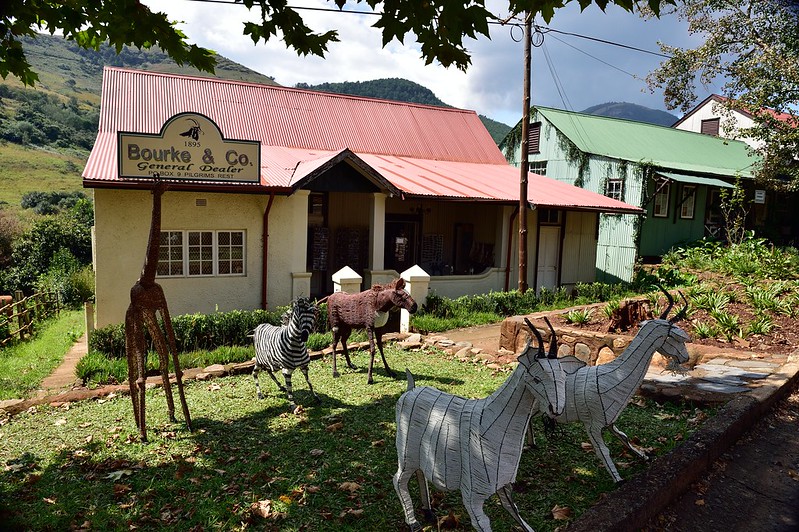
Pilgrims Rest
Pilgrim’s Rest Pilgrim’s Rest (Afrikaans: Pelgrimsrus) is a small museum town in Mpumalanga, South Africa. This popular tourist location takes visitors back in time to the days of the gold rush in the 1870s. It was the second of the Transvaal goldfields, attracting a rush of prospectors in 1873, soon after the MacMac diggings started some 5 kilometers away. When it first became a tourist attraction in 1970, it was changed very little from its heyday and is now a protected historical site.
It was estimated that in the beginning of 1874, there were some 1500 prospectors working about 4000 claims around the town. As so often happens when an influx of potential customers increases the population of a town, no matter how temporarily, businesses appear overnight to take advantage of the boom, charging outrageous prices that the many hopefuls will pay in order to get the items they need to keep working their claims and survive another week or two.
The 1870 gold rush was not the first time the area had been the site of digging. Evidence of mining of the quartz reefs in ancient times was revealed during the most recent efforts to retrieve the gold buried within the soil of the town and surrounding area, as well as other parts of South Africa. Though the ancient miners’ identity remains unknown, it has been established that the region of Mpumalanga was part of a transit corridor that moved gold from South Africa to Arabia, India, and Phoenicia.
A visit to this popular tourist location takes you back in time to the days of the gold rush in the 1870s. When it first became a tourist attraction in 1970 it was changed very little from its heyday and is now a protected historical site. In 1986, the town was declared a National Monument and since then, a concerted effort has been made by curators, historians, architects, and other stakeholders to ensure that the integrity of its history is preserved at all times.
It is said that there is still gold in the ground, which is exciting for visitors to contemplate as they stand on the very site where 150 years earlier men, women, and children were frantically digging and panning for the elusive nuggets that would make them instantly rich beyond their wildest dreams. The scars of the frantic digging for gold by many prospectors are still obvious despite the passage of time and are just a part of what makes the town unique and interesting.
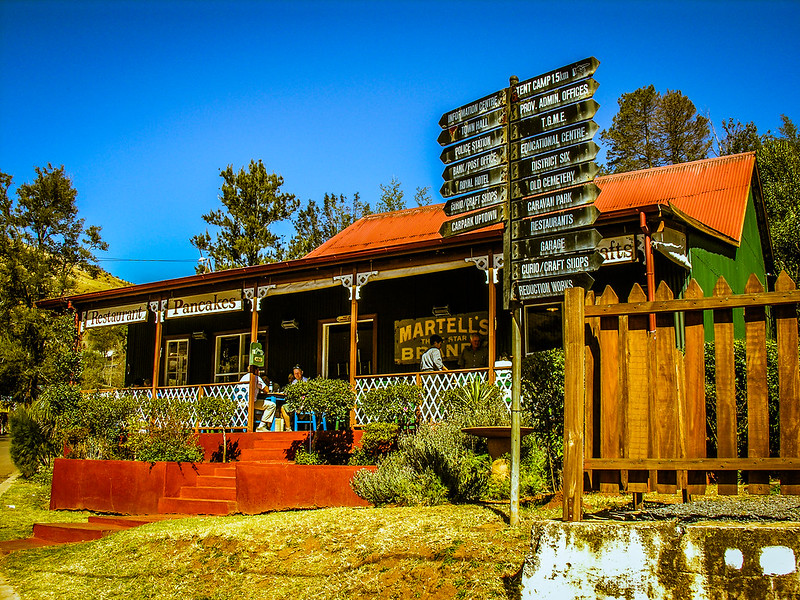
Well-known for its delicious pancakes, waffles, and homemade pies, Pilgrim’s Pantry is a welcome stop on a trip through the Panorama Route. Pilgrim’s Pantry is open every day for breakfast and lunch. You will experience friendly service and great food at reasonable prices in this fully licensed, family-friendly restaurant and coffee shop.
Built in 1894, the hotel has 11 elegant bedrooms situated in the Royal Hotel itself and the remaining 39 in cottages adjacent to the hotel, set in the surrounding historical gold-rush village.
The hotel sleeps 109 guests in total in six suites and 44 double or twin bed en-suite bedrooms in the main hotel and adjacent cottages, still carrying their historical names. The gracious Victorian accommodation boasts brass bedsteads and ball and claw baths for that old-world charm.
The Royal Hotel in Pilgrims Rest is a charming national monument, situated approximately 45 km from the Blyde River Canyon and the ‘Panorama’ scenic route.
Mpumalanga is a playground for those who love to explore, go on adventures, and soak up the beautiful scenery and wildlife this amazing country has to offer.
For more interesting stories visit Car Rental Reviews blog
